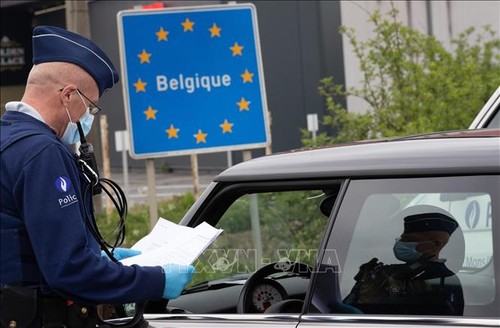
A Belgian policeman checks border crossing to France in Quevy, April 19, 2020
(Photo: AFP/VNA)
|
In April, the European Commission recommended closing the borders of the Schengen Area until May 15. But one week after the deadline, the visa-free Schengen Area remains shut, although the EU economy is predicted to shrink 10% this year as a result of coronavirus.
Differences over reopening borders
During a May 20 videoconference, EU tourism ministers debated reopening the borders by summer to save the tourism industry.
But the 27 ministers could not all agree with the plan proposed by the EC. Tourism Minister Gari Cappelli of Croatia, which holds the presidency of the EU, proposed a plan, which would include adopting a standard travel protocol and a "COVID-19 passport” for all EU countries.
France called for closer coordination between countries as it hopes to reopen its borders on June 15 with “generalized easing” of border control. Germany wants 11 southern European countries to meet to discuss reopening their borders.
Unity is key to Schengen Area
On May 13, the EC set out a guideline for resuming travel safely. The removal of border control measures would depend on meeting a set of epidemiological requirements.
European Commission President Ursula von der Leyen has called on members to collaborate on easing coronavirus restrictions. She warned that "insufficient coordination in the lifting of restrictions poses the risk of creating negative effects for all member states and will most likely increase tensions between them."
When the COVID-19 epidemic broke out, several EU countries closed their borders or imposed travel restrictions without giving other countries advance notice. Ms. Von der Leyen is hoping that the reopening of borders will be carried out in a more systematic fashion.
Experts say Europe lacks unity and needs a “conductor” to lead the COVID-19 response. Jacques Delors, president of an EU think tank told France Infor Radio that the EU must work together in border reopening. But many EU members do not want to give the EU the authority to deal with issues they think they can handle by themselves.
A Schengen Area free of internal border checks might be restored eventually. But the sustainability of the Schengen Treaty, which was touted as the biggest achievement of Europe’s integration over the past 35 years, is now at risk.